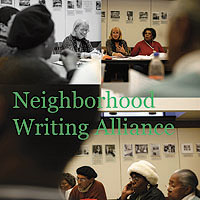Neighborhood Writing Alliance encourages community members to express creative voice
By Deva Woodlydeva@uchicago.edu
News Office
 Photos by Beth Rooney |
|
For 13 years, the Hyde Park-based Neighborhood Writing Alliance has been creating opportunities for adults in low-income neighborhoods to write, publish and perform works about their lives.
Sharon Warner, a long-time participant raves, “This is the best writer’s group I’ve been involved in, and the main reason I keep coming is the people. So many other groups deteriorate into clashes of egos, but everyone here is friendly and supportive. We generate good will and good work that’s published regularly.”
The Neighborhood Writing Alliance has always had roots at the University. Sunny Fischer, a School of Social Service Administration alumna, teamed up with University of Illinois-Chicago professor Hal Adams and Hyde Park resident Deborah Epstein to establish the organization, which then was moved to an office at Chapin Hall. In recent years, as a member of the Southside Arts and Humanities Network—a program of the Division of the Humanities’ Civic Knowledge Project—the Neighborhood Writing Alliance has expanded, running 14 writing workshops around the city in which the participants produce content for the organization’s quarterly publication, The Journal of Ordinary Thought.
The philosophy underlying the alliance is that “through writing and discussion about personal experiences—things that are happening in their homes, families, neighborhoods and the city at large—people will begin to explore political and social issues facing their communities,” said Executive Director Carrie Spitler.
The workshops are located in the libraries, schools, churches and social service agencies in low-income neighborhoods. At each workshop, a facilitator helps to inspire and moderate discussion, and serve as the first editor of the participants’ work. The best examples of the work are then published in the Journal of Ordinary Thought. The Journal is published quarterly with two issues concentrating on specific themes and the other two showcasing the work of participants on any topic.
“Even the themes come out of the workshops,” said Rupal Soni, Program Director. “We don’t mastermind them here, but we do choose the ones we can imagine sustaining people’s interest for four or five months.” During that time, the writing alliance creates programming that Soni hopes “helps participants to think about the themes in different ways and from different perspectives,” such as film screenings, expert speakers, discussions with community activists and participant performances.
The next themed issue, titled Choices, will come out this summer. The supportive programming ranges from a seminar on how to make sound financial choices to a discussion that explores how to choose sustainable foods, following a screening of the popular film Soul Food.
The writing alliance’s longest-running writing workshop convenes at the Hall Branch library in the historic Bronzeville neighborhood. Some members have attended for a dozen years. Jeanette Moton explained how she became involved in the workshop after the death of her husband in 2004. “I never had a passion for writing until I came here. I was very shy at first, but after a few weeks, I wrote my first poem. I didn’t know there was so much that could come out of me.”
James Rushing, who has been at the workshop for five years adds, “The workshop serves a lot of purposes. It’s an outlet, a social group. Sometimes it’s therapy. And in addition to all that, we turn out some really good work.”
The informal networks that develop through the Neighborhood Writing Alliance are an important part of the mission. One of Spitler’s favorite anecdotes is about a workshop on the near-West side.
A man who had never attended the workshop read a powerful piece about the daily grind of homelessness. Although no one knew whether he was speaking from personal experience, another participant, who happened to work at a shelter, slipped him a card, and it turned out the man needed a bed for the night. “It’s hard to measure, but we know things like that happen all the time,” said Spitler.
Soni pointed out that the writing alliance also seeks to build community on an institutional level. “We collaborate because it helps to enhance the capacity of our organization, but it also supports our effort to incorporate the pursuit of social justice into our programming. There are a wealth of resources, and through collaboration we can connect our writers with causes that they may care about, but not know how to get involved.”
The overall goal is not only to create quality local literature and poetry, but also to help people make connections. “We mean that on a number of levels,” said Spitler. “We hope people make connections between their own lives and politics, between the people in the room who may not understand each other or who may disagree, between folks in the neighborhood or across the city who may be able to share resources and knowledge.”
Assistant Director Mairead Case added, “people come to the workshops to write, but they also end up having conversations with their neighbors that they wouldn’t have at the bus stop. Yet, these are the people that they would meet at the bus stop. It’s another way to build community, and strong communities can change things for the better.”
Related Stories
![[Chronicle]](/images/sidebar_header_oct06.gif)